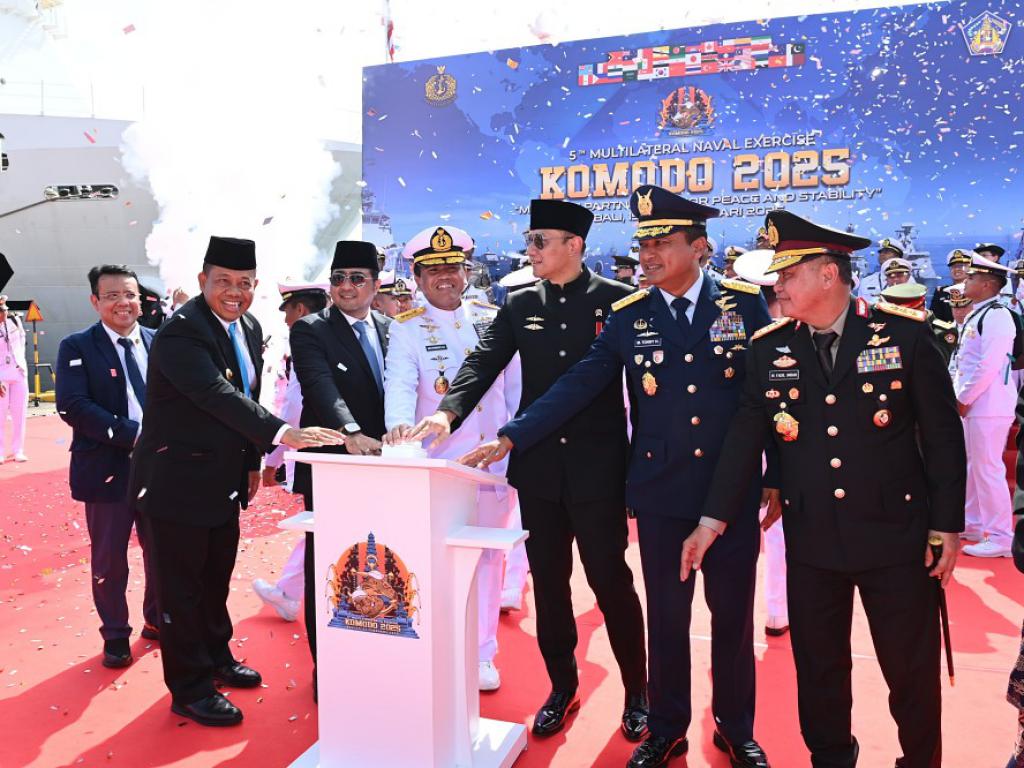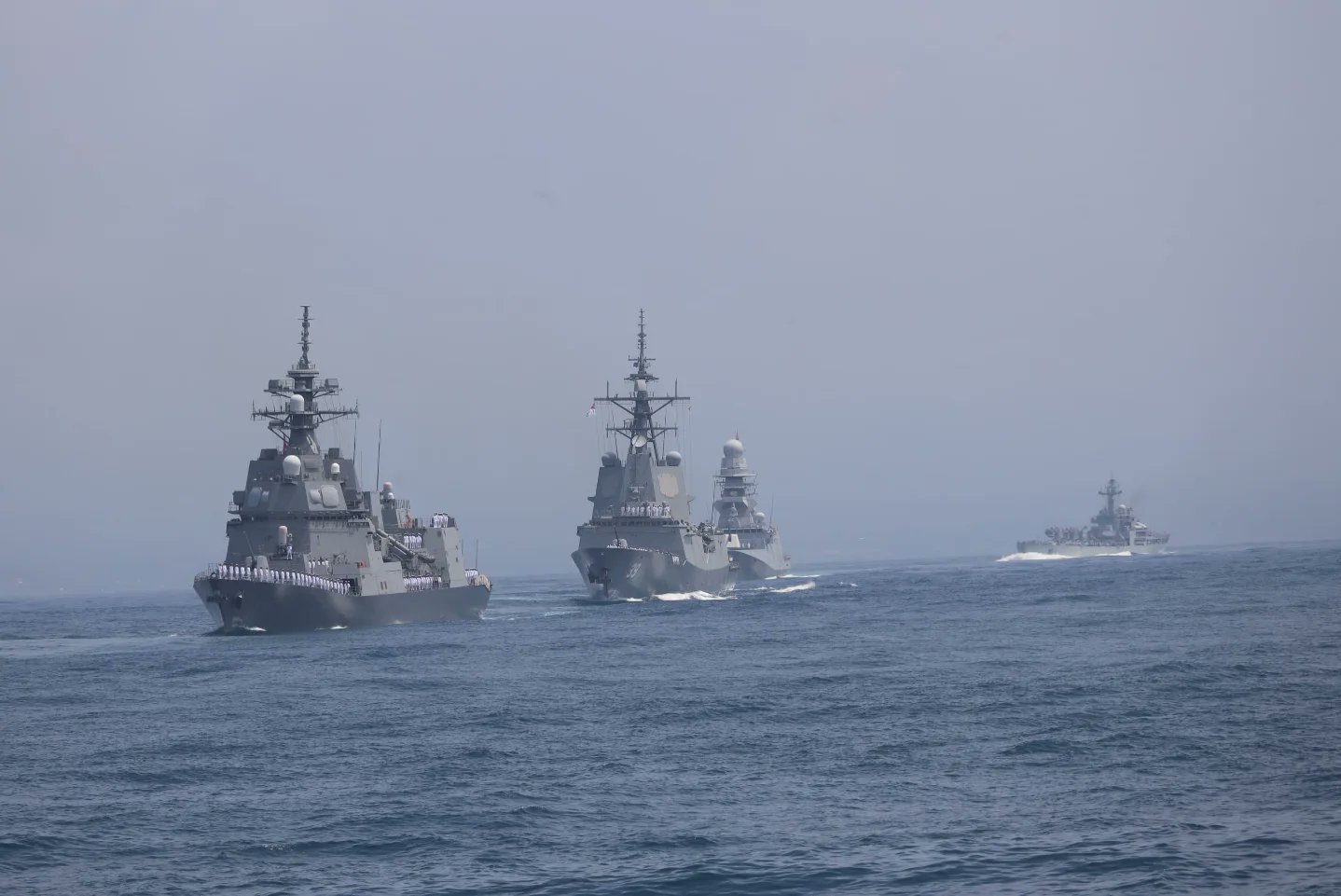In a turn of events that defies recent tensions and rivalries, Russian, Chinese, American, Indian, Australian, and other allied naval forces have converged in the strategic waters of the Indonesian archipelago for the Komodo 2025 exercise.
Indonesia is hosting the Komodo 2025 exercise, which began on February 16 and runs until February 22. Over 30 countries are participating.
Admiral Muhammad Ali, Chief of Staff of the Indonesian Navy, confirmed that 38 countries and 19 foreign warships are participating in the 5th Multilateral Naval Exercise Komodo (MNEK), which is being held in the waters of Tanjung Benoa, Bali.
The exercise also includes seven helicopters and three Maritime Patrol Aircraft (MPA) and is centered around the theme “Maritime Partnership for Peace and Stability.” Warships from several countries, including the US, Russia, India, Australia, China, and Singapore, have been deployed for the joint training.
According to reports, although Indonesia regularly extends invitations to North Korea, the country has never sent ships to participate in the exercise.

From Russia, the Pacific Fleet is represented by a detachment of ships, including the corvettes “Rezky,” “Hero of the Russian Federation Aldar Tsydenzhapov,” and the medium sea tanker “Pechenga.”
The US is represented by the USS Dewey (DDG-105), an Arleigh Burke-class guided-missile destroyer, while India has deployed INS Shardul and the Long Range Maritime Surveillance P8I aircraft for both the International Fleet Review (IFR) 2025 and the MNEK.
Australia has contributed the HMAS Hobart, the lead ship of the Royal Australian Navy’s (RAN) Hobart-class air warfare destroyers.
Chief of Joint Operations, Vice Admiral Justin Jones AO CSC, RAN, noted that this marks Australia’s fifth participation in the Komodo exercise.
In addition to the convergence of NATO and Russian forces, a photo taken last month during the 2025 MNEK Final Planning Conference aboard the KRI I Gusti Ngurah Rai-332, docked at Benoa Port, Bali, showed the Ukrainian flag in the background. This suggests the potential involvement of a Ukrainian delegation alongside the Russian delegation in the planning phase.
However, it remains unclear whether Ukraine has sent a delegation to the ongoing exercise. The EurAsian Times has contacted the Ukrainian foreign ministry for clarification and awaits a response.
US & Russia In Komodo 2025 Exercise
MNEK 2025, hosted by the Indonesian Navy, is an international joint exercise taking place near Bali, Indonesia. This multinational maritime drill has been conducted every two years since 2014, though no exercises were held in 2020 or 2022.
The primary goal of the exercise is to enhance interoperability among navies in disaster relief and humanitarian operations.
Disaster Averted! How Snow & Skills Saved Delta Flight 4819 From Catastrophe At Toronto Pearson
In addition to naval drills, the Komodo-2025 program includes forums for officers to exchange experiences and ideas, as well as bilateral meetings with naval representatives from various countries, culminating in the International Symposium on Maritime Security.
Indonesian Navy Chief of Staff Admiral Muhammad Ali explained the rationale behind hosting such exercises: “We survived the tsunami disaster and received help from other countries. Therefore, we must practice to enhance our performance and provide assistance more effectively.”
His statement refers to the devastating December 2004 tsunami, which claimed the lives of over 200,000 people in Indonesia and other affected nations.

The presence of US and Russian warships in Indonesian waters for the Komodo 2025 exercise holds major symbolism. It represents an uncommon instance of cooperation between two naval forces traditionally at odds.
For the United States, it is a step toward deeper involvement in the Indo-Pacific and a commitment to preserving maritime stability and security.
Russia’s participation aims to increase its influence and build stronger relationships with regional countries as tensions with Western powers continue.
Moreover, Russian media is describing the participation of Russian warships alongside NATO vessels as a “big shift.”
Admiral Sergei Avakyants, former commander of Russia’s Pacific Fleet, pointed out that the key aspect is the countries involved and their agreement to collaborate in the exercise. He sees this as a significant change linked to recent shifts in foreign policy and the new direction of the United States.
Avakyants highlighted Russia’s extensive experience collaborating with various navies and recalled that during joint exercises with the US Navy in the mid-1990s, Russia used combat weapons such as mines, bombs, and artillery. However, this time, the focus will likely be on humanitarian operations, anti-piracy measures, and joint maneuvering.
The admiral also stressed the importance of Russia strengthening naval cooperation and deepening ties with countries in the region. He excluded the US allies—Australia and New Zealand—from this approach.
- Contact the author at ashishmichel(at)gmail.com
- Follow EurAsian Times on Google News




